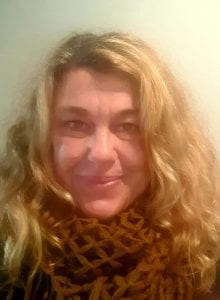Sometimes a study journey can begin with grief, but that does not mean the journey must be defined by it. This is the case for UNE PhD student Vicki Antonia Oliveri.
Vicki alongside her brother, was a carer for her parents during 2007-2008 the final stages of their lives. Following her loss, Vicki decided that she wished for a “productive time out to reset” and process her grief.
“After being a carer, I craved to be surrounded by the things of beauty found in the arts,” said Vicki. “Doing a Bachelor of Arts helped achieve that and it also gave me the opportunity to see what would stir my passion.”
After studying her undergrad it is safe to say that Vicki’ passion was stirred by the research field of art crime. This led her from her Bachelor of Arts into an Honours research project that focused on art crime, an area that she discovered during her time studying her undergrad.
“I did a unit on art crime and I was hooked! I went on to complete my Honours researching two cases of unsolved art thefts – the 1990 theft at Boston’s Isabella Stewart Gardner Museum and the 2007 theft at the Art Gallery of New South Wales. It later occurred to me that I had transitioned from wanting to surround myself with things of beauty, to wanting to protect them! And that really is what motivates my research: How can we protect our collective cultural heritage?”
Through her Honours, Vicki had nurtured her lingering interest in art crime and with some encouragement decided to continue her research in the field. Naturally, Vicki’s PhD studies involve studying in the field of art crime and cultural heritage protection, which also means that she has now been studying in this field for 10 years. Her PhD research project includes investigating Australian public galleries that acquired allegedly looted Indian antiquities. She is also researching the destruction of Juukan Gorge caves by Rio Tinto – a site sacred to the First Nations people in the Pilbara region of Western Australia. By analysing the factors that led to these events, Vicki hopes to identify practical strategies to enhance cultural heritage protection.
“I am fortunate to be researching a fascinating topic, where truth really can be stranger than fiction!”
“Through my PhD studies I have so far had 2 book chapters and a journal article published, and I am in the process of completing 3 more papers for publication. I have had great opportunities to speak about art crime on radio and at a couple of conferences. These are all things I never would have imagined doing!”
“It helps to have a wonderful group of supervisors whose feedback hones my writing skills. But overall, I believe that not giving up when things got hard is probably my greatest achievement!”
While Vicki considers herself lucky to be researching in her field, she has gotten where she is thanks to her inspirational passion and drive. This drive has also provided Vicki with some fantastic insights for her fellow students and those who might be following a similar path to her own.
“Pick a topic you are passionate about, because that will sustain you through the tough periods! Know that other PhD students I have spoken to have all said the same thing: the first year of your candidature is all about working out what you are doing. And you will have many moments where you ask yourself ‘What am I doing?’ But you will work it out. Also, it’s true: write a little bit every day and you will get so much more written.”
“I remember when I was doing my Honours, my supervisor would say to me: ‘You are not doing a PhD!’ and then when I started my PhD, my supervisor would say to me: ‘You are not going for the Nobel Prize! You are writing for the PhD examiners.’ Sometimes we can put too much unnecessary pressure on ourselves.”


Recent Comments